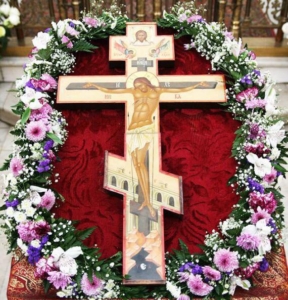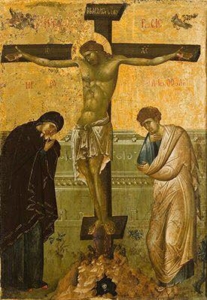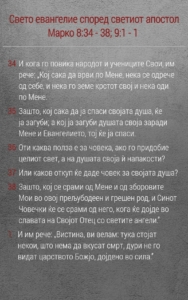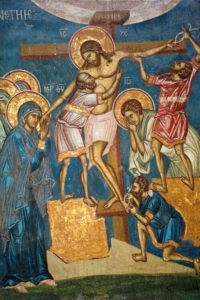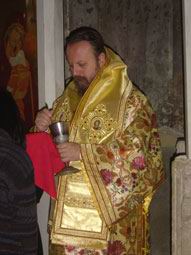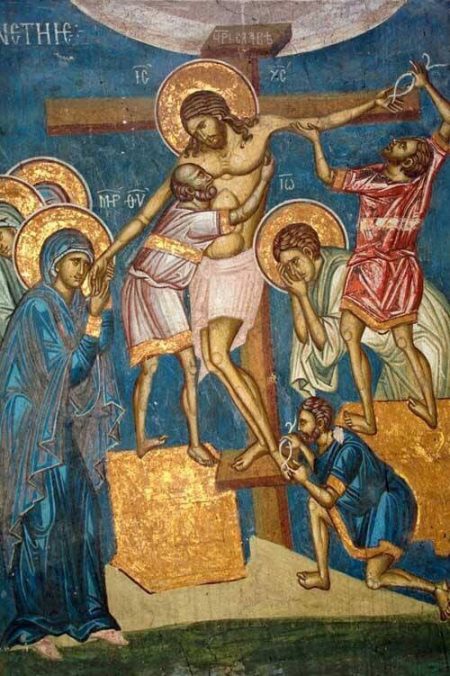
„Ако некој сака да оди по Мене, нека се одрече од себе, нека го земе крстот свој и нека врви по Мене! Оти кој сака да ја спаси душата своја, ќе ја загуби; а кој ќе ја загуби душата своја заради Мене, тој ќе ја спаси“ (види: Матеј 16, 24–25; Лука 9, 23–24; Марко 8, 34–35).
Светите апостоли Матеј, Марко и Лука во Светото Евангелие речиси идентично ги имаат запишано зборовите со кои Христос ги поучува Своите ученици. Овие зборови, со кои Господ лично му се обраќа на секој од нас, денес се уште поактуелни, а ќе бидат и до крајот на овој свет и век.
Забележуваме два дела во оваа поука.
Во првиот дел – кога ни вели да се одречеме од себе, да го земеме својот крст и да врвиме по Него – Господ Исус Христос нè повикува да ги поминеме трите степени од нашиот духовен развој: чистењето на срцето од страстите, просветлувањето на умот и обожението на личноста.
Одрекувањето од себе одговара на првиот степен од духовниот развој – чистење на срцето од страстите, и трае сè до отворањето на срцето за умно-срдечната молитва. Одрекувањето од себе подразбира одрекување од нашето болно јас, кое поради гревовната навика просто се поистоветува со своите страсти: сластољубие, среброљубие и славољубие. Одрекувањето од болното себе е предуслов за исцелителна заедница со Бог. Ова одрекување се случува од моментот кога ќе ги исповедаме своите гревови и ќе почнеме да живееме под раководство на духовен отец.
Земањето, односно носењето на крстот е поврзано со вториот степен од духовниот развој – просветленоста, и дарот на умно-срдечната молитва. Од една страна, тоа е голем молитвен подвиг, т.е. љубов кон Бог, а од друга страна, поради луѓето коишто, водени од демонот, нè напаѓаат и мразат, без ништо лошо да сме им сториле, тоа е голем подвиг на аскетска љубов и кон непријателите.
Одењето по Христос, во вистинска смисла на зборот, се однесува на третиот степен на духовниот живот – обожение, кога човекот е ослободен од страстите и од дејството на демонот, и ги љуби благодатно сите, без исклучок, автентично сведочејќи Го Богочовекот Христос.
Во вториот дел нè потсетува дека нашата душа е болна и заробена од страстите, и дека ако сакаме да ја спасиме, трeба да ја исцелиме од нив. Вториот дел од поуката нè освестува за важноста на првиот. И, навистина, ако не го освестиме фактот дека сме болни – или поинаку, дека сме заробени од страстите, од гревот, од демонот и од смртта – никогаш нема да ја почувствуваме потребата од Лекар и Спасител на нашите души и тела. И нема да се обратиме кон Богочовекот Исус Христос. На луѓето со високо мислење за самите себе, како и на оние што пребиваат во незнаење, им се случува да го освестат фактот за заробеноста дури после доживувањето на сериозни несреќи и болести во својот живот. Да не бидеме како нив!
Пресвета Богородице, спаси не!
Митрополит Струмички Наум
9-ти март 2018 лето Господово
“Whoever desires to come after Me, let him deny himself, and take up his cross, and follow Me. For whoever desires to save his life will lose it, but whoever loses his life for My sake and the gospel’s will save it.” (see; Matthew 16, 24-25; Luke 9, 23-24; Mark 8, 34-35).
The Holy Apostles Matthew, Mark, and Luke in the Holy Gospel have each recorded an almost identical version of the words by which Christ taught His disciples. These words, with which the Lord personally refers to each one of us, are even more relevant at present, as they will be until the end of this world and age.
We note two parts in this lesson.
In the first part – when He tells us to deny ourselves, take up our cross and follow Him – the Lord Jesus Christ invites us to pass the three stages of our spiritual development: purification of the heart from the passions, enlightenment of the mind and deification of the person.
Denying ourselves corresponds to the first stage of spiritual development – purification of the heart from the passions, and lasts until the opening of the heart for prayer of the mind in the heart (ceaseless prayer: “Lord Jesus Christ, have mercy on me”). Denying one’s self refers to the renunciation of our painful self, which due to the sinful habit simply identifies with its passions: gluttony, covetousness and vain glory. Denying of the sick self is a precondition for a healing community with God. This denial takes place from the moment we confess our sins and begin to live under the guidance of a spiritual father.
The taking up of the cross, is related to the second stage of the spiritual development – enlightenment (of the mind), and the gift of the prayer of the mind in the heart. On one hand, it is a great prayerful struggle, that is love towards God, and on the other hand, because of the people who, led by the demon, attack us and hate us, without us having done anything bad. It is a great struggle of ascetic love towards our enemies.
Following Christ, in the true sense of the word, refers to the third stage of the spiritual life – deification, when a man is freed from the passions and the action of the demon, and loves all people gracefully, without exception, authentically testifying the God-Man Christ.
The second part reminds us that our soul is sick and trapped by passions, and that if we want to save our soul, we need to heal it from the passions. The second part of the lesson brings us to awareness of the importance of the first part. Indeed, if we do not see the fact that we are sick – in other words, that we are trapped by passions, by sin, by demon, and by death – we will never feel the need of the Healer and Saviour of our souls and bodies. And we will not turn to the God-Man Jesus Christ. People with a high opinion of themselves, as well as those who are unaware (lack of knowledge), are going to be aware of the fact of captivity only after experiencing serious accidents and illnesses in their lives. Let us not be like them!
Holy Mother of God, save us!
Metropolitan Naum of Strumica
March 9, 2018 God’s year
Mark 8:34-9:1
| 34 | When He had called the people to Himself, with His disciples also, He said to them, “Whoever desires to come after Me, let him deny himself, and take up his cross, and follow Me. |
| 35 | For whoever desires to save his life will lose it, but whoever loses his life for My sake and the gospel’s will save it. |
| 36 | For what will it profit a man if he gains the whole world, and loses his own soul? |
| 37 | Or what will a man give in exchange for his soul? |
| 38 | For whoever is ashamed of Me and My words in this adulterous and sinful generation, of him the Son of Man also will be ashamed when He comes in the glory of His Father with the holy angels. |
| 1 | And He said to them, “Assuredly, I say to you that there are some standing here who will not taste death till they see the kingdom of God present with power.” |

